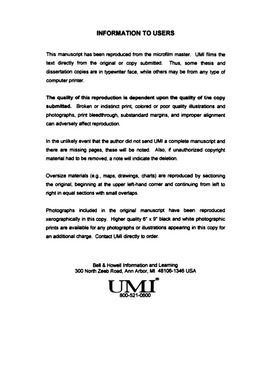| dc.contributor.advisor | Dillon, Connie, | en_US |
| dc.contributor.author | Wilson, Michael Stanley. | en_US |
| dc.date.accessioned | 2013-08-16T12:30:48Z | |
| dc.date.available | 2013-08-16T12:30:48Z | |
| dc.date.issued | 1999 | en_US |
| dc.identifier.uri | https://hdl.handle.net/11244/5904 | |
| dc.description.abstract | Findings suggest that cultural discontinuities in print materials occur in four areas. These areas include differences in the world views between authors and learners, culturally specific knowledge, linguistic factors and cognitive organization associated with the largely oral nature of many cultures found in developing nations. | en_US |
| dc.description.abstract | Instructional materials used in the students' extension program were evaluated for instructional format. Interviews and think-aloud protocols with West African extension students, and interviews with instructors and administrators provided the data. Interviews examined student motivation, experiences in learning to read, and insights into cultural discontinuities in instructional texts. Interviews with teachers and administrators focused on their observations of student behavior and cultural discontinuities in the classroom. The protocols investigated students' cognitive processes in reading French texts and cultural factors that influenced the students' construction of meaning. | en_US |
| dc.description.abstract | Aspects of instructional intervention may include increasing instructor's knowledge of significant aspects of learners' worldview, augmenting background information needed by students, activities to promote the learning of needed cognitive processes and text modifications compatible with the target learners' reading characteristics. | en_US |
| dc.description.abstract | The evidence suggests that collectively, cultural groups have distinct learning styles and modes or "cultural learning sets." When instructional formats produced in one culture don't complement the learning set of another, significant learning impediments may occur. Without direct interaction, instructors may not compensate for learner differences, especially if the instructional format is primarily print-based. | en_US |
| dc.description.abstract | This research sought to illuminate the nature and degree of cultural discontinuities that occur in cross-cultural distance instruction. It presents findings involving the interaction between American print-based distance materials and West African adult learners. | en_US |
| dc.description.abstract | Vygotsky has provided broad theoretical underpinnings of the nature of the cross-cultural interface. Flowerdew and Miller posit four specific interface factors: learners' ethnic, local, academic and disciplinary cultures. Tharp's psycho-cultural variables theory includes social organization of the instruction/ learning event, sociolinguistic factors, cognitive processes and learner motivation. All suggest a basis for interpreting the interface between teacher and learner. | en_US |
| dc.description.abstract | Educational advances in technology and communication have made possible delivery of instruction to learners around the world. This adds another dimension to distance education: cultural distance. | en_US |
| dc.format.extent | x, 244 leaves : | en_US |
| dc.subject | Education, Adult and Continuing. | en_US |
| dc.subject | Distance education Africa, West. | en_US |
| dc.subject | Psychology, Clinical. | en_US |
| dc.subject | Education, Bilingual and Multicultural. | en_US |
| dc.subject | Distance education Cross-cultural studies. | en_US |
| dc.subject | Intercultural communication Africa, West. | en_US |
| dc.title | Cultural discontinuities between West African adult learners and print-based distance instructional materials. | en_US |
| dc.type | Thesis | en_US |
| dc.thesis.degree | Ph.D. | en_US |
| dc.thesis.degreeDiscipline | Department of Educational Leadership and Policy Studies | en_US |
| dc.note | Major Professor: Connie Dillon. | en_US |
| dc.note | Source: Dissertation Abstracts International, Volume: 60-12, Section: A, page: 4282. | en_US |
| ou.identifier | (UMI)AAI9957001 | en_US |
| ou.group | Jeannine Rainbolt College of Education::Department of Educational Leadership and Policy Studies | |
